“Ok Kellen,” said Theo as we sat analyzing maps in Khiva, “we just hauled our butts off from Tashkent, putting in 150km days over road construction and through sickness and extreme heat. Now, it’s 1150km from here to the Caspian Sea over some of the worst roads and most inhospitable terrain on the planet. How fast do you think we can make it?”
“Hmmm, 8 days... I think we can do it.”
“Ha! 8 days, I’m not so sure, but I’m in. If we make it in 8 days, we’re heroes.”
Eight days later we were sitting on a bench in Aktau, Kazakhstan on the Caspian Sea reminiscing on this conversation. But we were no glamorous dragon-slaying heroes; we were more like Rocky Balboa, just able to sustain an absolute beatdown for a very, very long period of time. Taken as a whole, the segment from Tashkent to Aktau was definitely the most difficult section of the trip. If I were to plot this difficulty level on a graph, it would look like a half-parabola that skyrockets the closer we got to the Caspian. It was tough. Those of you keener readers out there know that the blog is a bit delayed and you will now see why we dropped off the grid for a couple weeks because frankly, in most of these places, there is no grid.
In his post, Cory wrote about the difficulty of the ride to Samarkand, where, I found out later, we pushed him to the point of tunnel-vision. Instead of throwing anger at his brother for encouraging him up “the last hill” and “the last hill” and then “the last hill” before Samarkand, he chose to direct it at his body for not being able to keep up. He’s a tough cookie, that one. Theo and I pushed him hard because we thought he could handle it and he needed to, as it didn’t get any easier. He did.
The ride to Bukhara and then Khiva was laden with 200km of construction, sand-dune covered roads, extreme heat, incessant flies, and sickness.
As we always arrived at these chaikhanas starving, downtrodden, and dehydrated, I did not fully appreciate their singularity until after the fact. They are the only oases for hundreds of miles in the desert and consequently serve as true 21st century caravanserais, mixing local camel herders, Russian truckers, gypsy families, and touring cyclists. It’s difficult to appreciate when you’re patching flat tires, dripping in sweat, and leaning over yet another plate of tough-as-gum lamb, but they have settled in my memory as some fascinating out-of-this world places.
Thirty seconds into Kazakhstan the road completely disintegrated and stayed that way for the next 400 kilometers. Possibly always dirt, possibly once paved by the Soviets, either way it was all busted rock and dirt now and clearly unmaintained for the last 20 years. At just over 10km/hr we were riding sometimes 14 hours per day just to continue to hit our 150km/day pace; it doesn’t take a lot of imagination to judge how our butts felt after that many hours over washboard tracks. The road was so bad that many trucks chose to simply ride 100 meters off into the desert as it was probably less stress on their suspension.
As I mentioned previously we dreaded this desert segment and it turned out to be quite the test. We rode it because we want to ride our bikes all the way across Asia and this section is part of that route. In the end, I am very happy that we did; it was an unbelievable experience and a good battle. But we did not thrash along at those speeds to set any kind of record (though Theo and I are convinced we did) or give fodder to a heroic cycling tale. We sped to Aktau to give ourselves the best chance of catching the elusive ferry that runs across the Caspian Sea from Aktau, Kazakhstan to Baku, Azerbaijan. This “ferry” is actually a material freighter that also takes passengers but has no set schedule because it only leaves each port when full. There’s no information online and so we just had to hope that when we arrived and went to the port, the wait would only be a few days rather than a few weeks. When we bid adieu to Cory and Alexander, this was his one task for the day in Aktau.
At 10pm, Theo and I sat on the bench in our hotel in Aktau reminiscing on our conversation from Khiva when Cory walked in the door.
“2am! That’s four hours! Can we still buy tickets? When does the next one leave?”
“Yeah, I know! Well the ticket office closed at 6pm and she wouldn’t let me buy tickets earlier without your passports. She didn’t know when the next one would leave but the last one left on July 8 [19 days earlier]. I think we ought to just head down to the port and try to bribe our way on.”
And that was it, we were up and off again – ain’t no rest for the wicked. Within two hours we had showered, gotten money and food (as there is no restaurant on board), and fixed Cory’s bike enough to get it to the port. We rolled away to the port; Cory rode the first three kilometers and then ran next to his bike the final three as the back tire was too flat to ride. By 1am we arrived. Theo spoke with some of the port guards, who noted that we could not board without tickets, but also that the boat arrived at 2am but was unlikely to leave until much later in the day. We slept at the port. At 8am the ticket office reopened and we secured our tickets. By 3pm we were on the boat. At 5pm the boat set sail south across the Caspian to Azerbaijan.
The three of us stood on deck and laughed at each other in disbelief. Everything we just put ourselves through paid off: 21 days of racing across the desert and we had made the boat by mere hours. One day later and we would have missed it. I was a happy man, and now it was time to rest.
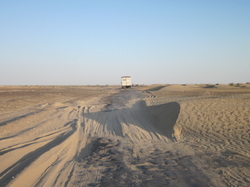
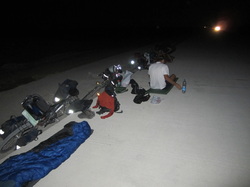
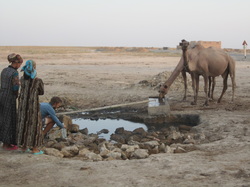
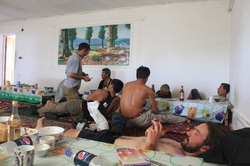
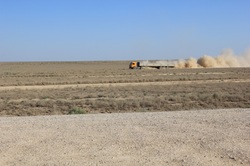
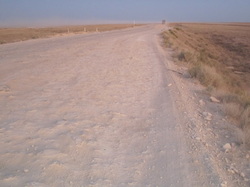
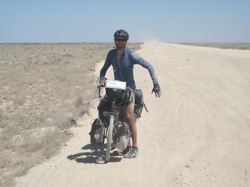
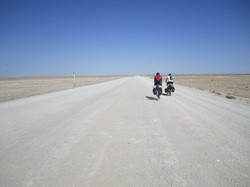
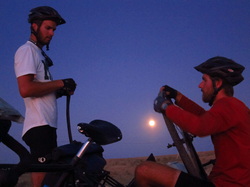
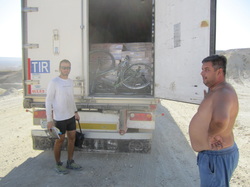
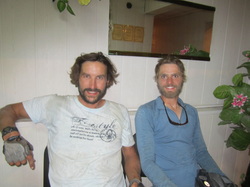
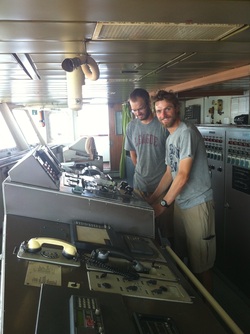
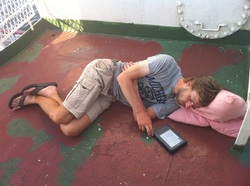
 RSS Feed
RSS Feed